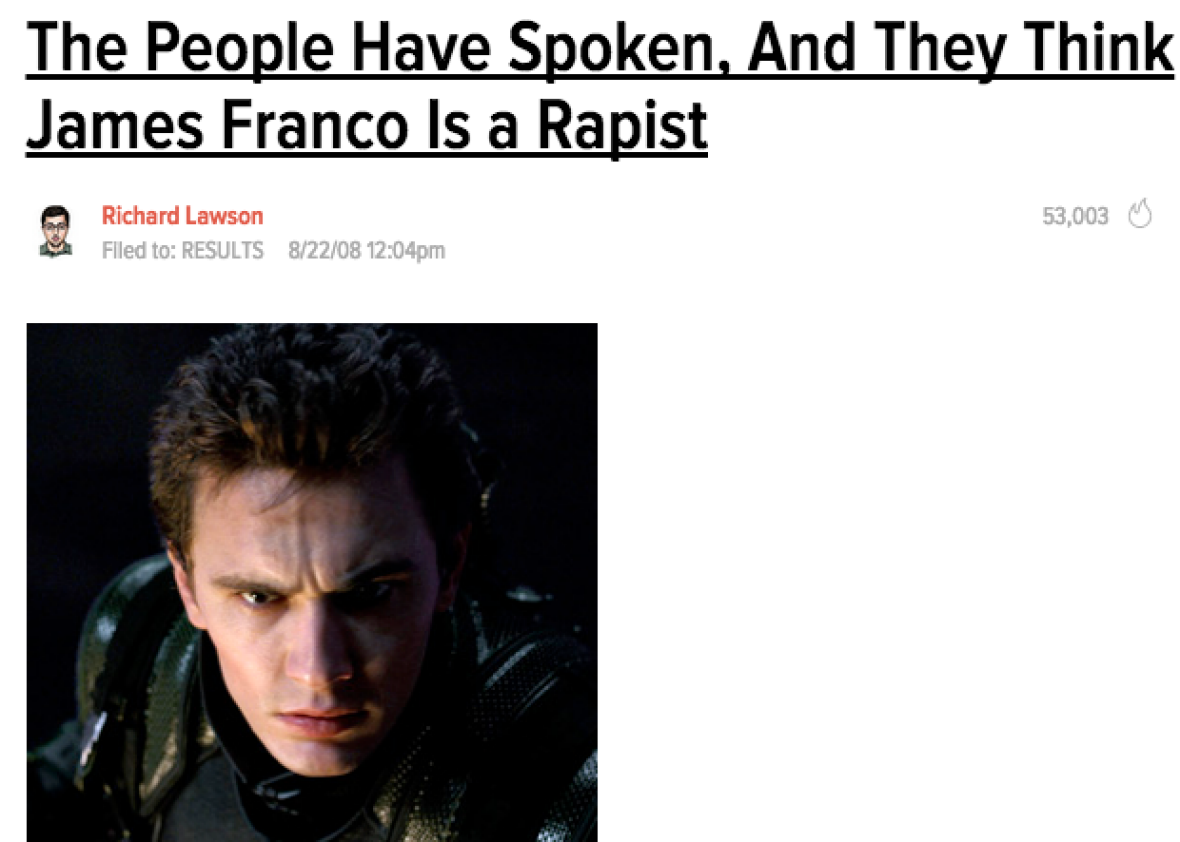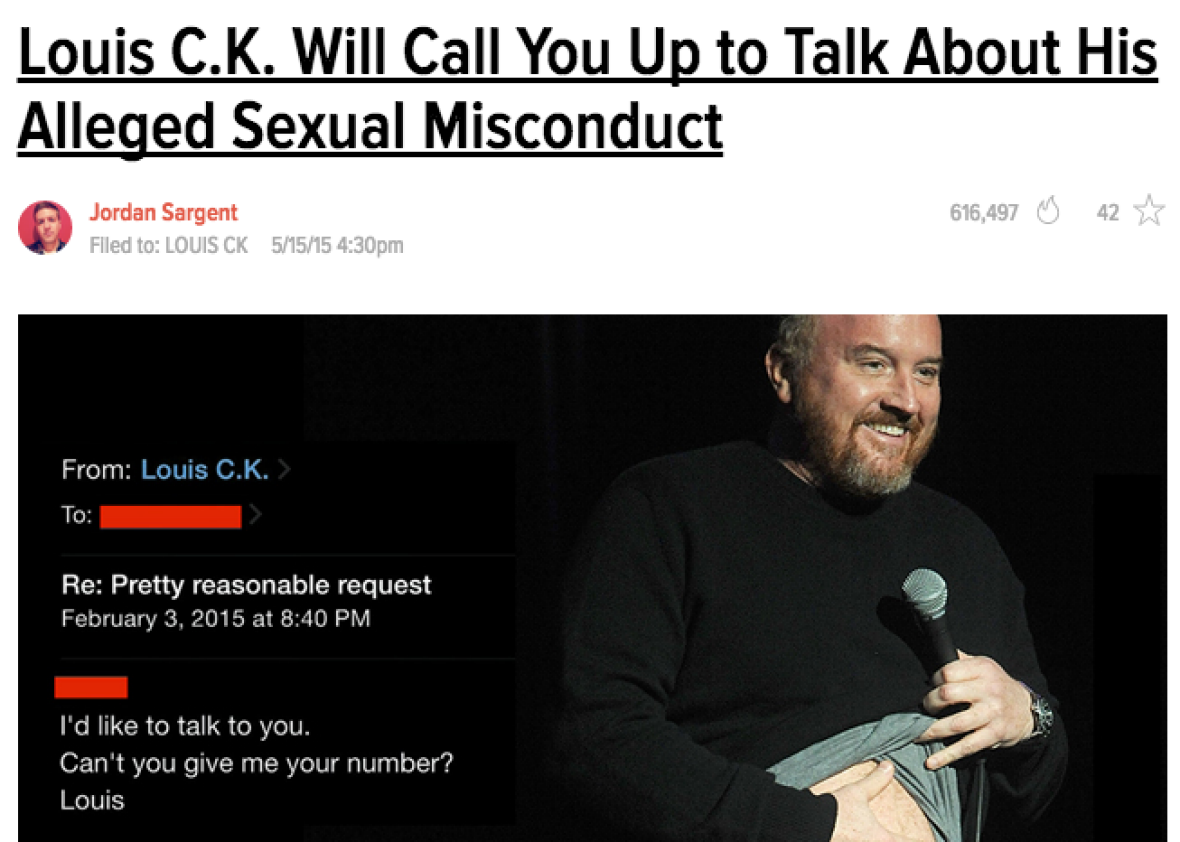Gawker’s decision last week to publish and then withdraw a story about a male media executive soliciting a male prostitute has sent the company into turmoil, with two of its top editors resigning in protest on Monday. The whole kerfuffle raises significant questions about the ethics of outing, the importance of editorial independence, and what constitutes news.
One other simple question, though, can help clarify everything that has happened in the past few days: Was the post in question consistent with what Gawker had published in the past and with its historic editorial directive? In defending the story’s publication, Gawker Media Executive Editor for Investigations John Cook said on Twitter that the answer was clearly yes: “[The] post was solidly in line with what Gawker has asked its writers and editors to do for years.” That is still a questionable enough proposition, though, that Gawker Media founder and CEO Nick Denton initially opposed the story’s publication—along with several staff members—and ultimately took the dramatic step of actually having the story removed.
So, what is it the site is supposed to be doing, and was this just a case of Gawker being Gawker? Last month Denton described the site’s prime directive like so: “I have a simple editorial litmus test, which is: is it true, and is it interesting?”
To answer whether or not this story met that standard, we’ve excavated some of the more controversial posts that the site has published over the years and attempted to determine to what extent those stories fell within Gawker’s editorial mandate. A journalist’s editorial mission, though, doesn’t define what makes her work important or valuable to her audience. As such, we’re also going to examine whether or not the site was doing what many of us love most about it, as articulated by Slate’s Justin Peters last week—that is, to what extent it was afflicting the comfortable by punching up with its journalism, or taking cheap and unnecessary shots by punching down. Here are the stories we remembered causing a stir, in no particular order.
Story: “Elijah Pollack Is Going To Be A Horror”
Controversy: In 2007, Gawker pointed to a blog in which author Neal Pollack described his 4-year-old son Elijah as having a snobbish (he might call it refined) taste in cheese. The elder Pollack took great umbrage at the characterization of his son as a “horror” in the making and “the worst.”
Direction being punched: Down. Toward a child.
Did it meet Gawker’s mandate? No. The post got 48,000-plus page views, so it was clearly interesting to somebody at the time. But Denton reportedly reached out to Pollack afterward to say that he didn’t particularly care for the story. Denton told Pollack he couldn’t take the post down, but he did offer to fiddle with the story’s SEO to keep it from being Elijah’s top search term.
Story: “The Cruise Indoctrination Video Scientology Tried To Suppress”
Controversy: Scientology forced YouTube and other sites to take down the copyrighted video, but Gawker kept it up.
Direction being punched: Up. Toward Xenu.
Within Gawker’s mandate? Yes. That video, published in 2008, is a hilarious and fascinating look into how the organization markets itself.
Story: “The People Have Spoken, And They Think James Franco Is a Rapist”

Via Gawker.com.
Controversy: In a series of 2008 posts, Gawker essentially accused James Franco of sexually assaulting a same-sex partner. The initial post was part of a “blind item”—the site’s clearinghouse for anonymous gossip—but the site ultimately opened the story up to a vote for the public and strongly implied that Franco was the anonymous celebrity in question.
Direction being punched: Up. Toward a famous person.
Within Gawker’s mandate? No. It would be interesting if James Franco were a rapist who had sexually assaulted a same-sex partner, as Gawker indicated. They didn’t have the evidence to back up that assertion as definitively true, though.
Story: “Here Are the Unretouched Images From Lena Dunham’s Vogue Shoot”

Via Gawker.com.
Controversy: Jezebel published photos of Lena Dunham’s Vogue photo shoot that showed how the images had been Photoshopped to “enhance” Dunham’s appearance. Some thought it was body-shaming the Girls creator.
Direction being punched: Up. Toward Lena Dunham and Vogue.
Within Gawker’s mandate? Yes. This got 2 million page views. People are probably still Googling this story. Also, as Slate’s Katy Waldman noted at the time, it showed something true about corrosive beauty standards for women in glossy magazines and the betrayal of Dunham’s public image in this particular instance.
Story: “Who Is Lena Dunham’s Alleged Rapist?”
Controversy: Gawker attempted to push back against attacks on Dunham by conservatives who claimed that she had fabricated a story of sexual assault in her memoir. It did this by naming a guy who may or may not have attacked Dunham.
Direction being punched: Down. Toward some guy who might not be a rapist.
Within Gawker’s mandate? No. Gawker itself acknowledges that this guy might not be Dunham’s rapist, but part of a composite character. If that’s the case, and it’s not true that he’s a rapist, why name him?
Story: “Shepard Smith Tells Waitress: ‘Get My Fucking Drink!’ ”

Via Gawker.com
Controversy: Gawker casually may have outed the Fox News host as gay in one of its first big controversies over its policy toward outing public and private figures.
Direction being punched: Down. Toward a possibly closeted, non-hypocritical gay man.
Within Gawker’s mandate? No. The post did get more than 150,000 page views, but it doesn’t really hold up as all that interesting, even if the sourcing seems sound, and the story could very well be true. As Slate’s Mark Joseph Stern wrote, the site appeared to use the jerky behavior—which didn’t seem particularly noteworthy on its own—as a pretext to report on Smith’s sexuality. Neither is interesting, and Stern put it best: “They can feel free to dress it up as newsworthy, but that doesn’t mean the rest of us have to pretend that it’s real news.”
Story: “Asshole Gorilla Humps Robin Williams’ Corpse for Publicity”
Controversy: Robin Williams had just died, and Gawker published a provocative headline mocking how some were seeking to take advantage of the death for publicity. Commenters were not pleased.
Direction being punched: Sideways. Toward BuzzFeed. And down toward the Gorilla Foundation and Koko the gorilla.
Within Gawker’s mandate? Yes. A quarter of a million people read the story, which pointed out the vapidity and absurdity of viral mourning.
Story: “This Is Amazing Amy Pascal’s Cheap, Crotch-Intensive Beauty Regimen”
Controversy: Jezebel dug through the Sony leak emails to describe part of the fired Sony Pictures co-chairman’s Amazon and personal grooming habits.
Direction being punched: Down. Toward a fired movie executive.
Within Gawker’s mandate? Maybe. This wasn’t interesting to me, because who cares what this person—or any person—does with his or her body hair (within reason). But more than 100,000 people clicked, so who knows?
Story: “I Had a One-Night Stand With Christine O’Donnell”
Controversy: Gawker published the account of a man claiming to have had a one-night stand with the then–U.S. Senate candidate for Delaware. Many took the story to be shaming the conservative O’Donnell for having a sex life.
Direction being punched: Down. Toward a single woman.
Within Gawker’s mandate? No. The story may or may not have been true, but as Jack Shafer and Tom Scocca—now an editor at Gawker—both noted in Slate at the time, it was not interesting, and it was certainly not news.
Story: “Louis C.K. Will Call You Up to Talk About His Alleged Sexual Misconduct”

Via Gawker.com.
Controversy: Gawker pointed toward anonymous allegations of sexual harassment against the beloved entertainer and comic.
Direction being punched: Up. Toward a powerful comedian.
Within Gawker’s mandate? No. The story is interesting—see the more than half a million clicks—but the site cannot demonstrate whether the allegations in question were true, or even get a source on the record.
Story: “[Media Executive] Tried To Pay $2,500 for a Night With a Gay Porn Star”
Controversy: The controversy is clear—the site outed a non-celebrity without any clear journalistic reason, such as to point out hypocrisy or expose corruption. If anything, the site abetted blackmail of the figure in question.
Direction being punched: Down. Toward some guy who happens to have a famous name and good job.
Within Gawker’s mandate? Yes. The news value of the story is nil, but that’s not Denton’s historic “interesting” standard, as you can see above. Interesting, in the Dentonian sense, can be roughly translated as “juicy.” This story met that standard, as evidenced in part by nearly half a million page views before it was removed. As for the accuracy of the story, it was backed up by text messages and photos. Denton is standing by its veracity—although he has obvious legal reasons to do so—and saying he only took it down because his own personal standards of who deserves and doesn’t deserve to come under attack have evolved.
There appears to be some change at Gawker, and it appears to be new—as recently as last year in an email to some of his staff members, Denton defended outing of private figures as a journalistic practice and criticized one of his writers for taking a stand against another publication that had outed someone who ended up committing suicide. “If the author believes this, she’s working at the wrong place. And should be guided to a more congenial work environment,” Denton wrote. “We’re truth absolutists. Or rather, I am. And I choose to work with fellow spirits.” Within the context of Denton’s old standards, the story certainly seems like something Gawker would have historically published.
